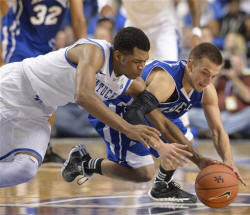|
 Judge: Challenges to NCAA rules can move forward Judge: Challenges to NCAA rules can move forward
 Send a link to a friend
Send a link to a friend
[November 09, 2013]
(AP) -- A federal judge ruled Friday that a lawsuit challenging the way the NCAA has used the images and likenesses of college athletes can move forward, but denied class action status to the plaintiffs that could have potentially put the NCAA on the hook for billions of dollars in damages.
|
|
 The 24-page partial class certification ruling was handed down by U.S. District Judge Claudia Wilken in Northern California. The case could still dramatically change the way the NCAA does business and its definition of amateurism, but Wilken ruled there was no way to determine which former players might have been harmed by the NCAA rules. Currently, college athletes cannot be compensated for use of their names, likenesses and images. The 24-page partial class certification ruling was handed down by U.S. District Judge Claudia Wilken in Northern California. The case could still dramatically change the way the NCAA does business and its definition of amateurism, but Wilken ruled there was no way to determine which former players might have been harmed by the NCAA rules. Currently, college athletes cannot be compensated for use of their names, likenesses and images.
Former UCLA basketball star Ed O'Bannon is the lead plaintiff among 16 former college athletes and some current college football players in the long-running legal battle with the NCAA. The plaintiffs are demanding the NCAA find a way to give players a cut of the billions of dollars earned from live broadcasts, memorabilia and video games sales, and other revenue.
The suit originally named video-game maker Electronic Arts and the Collegiate Licensing Company, but both of those companies settled with the plaintiffs in September.


[to top of second column] |

Both the lead attorney representing O'Bannon and the NCAA claimed Friday's ruling was a win for their side.
"The court's decision is a victory for all current and former student-athletes who are seeking compensation on a going forward basis," Washington-based attorney Michael Hausfeld said in statement. "While we are disappointed that the court did not permit the athletes to seek past damages as a group, we are nevertheless hopeful that the court's decision will cause the NCAA to reconsider its business practices."
NCAA chief legal officer Donald Remy said the ruling is "one step closer to validating" the NCAA's position that the plaintiffs are on the wrong side of the facts and the law.
"We are pleased that the court correctly found that conducting a class-wide trial for claimed damages for student-athletes who played college football and men's basketball going back nearly a decade would be completely unmanageable and unprecedented," he said. "The plaintiffs in this case were seeking substantial damages based on erroneous theories for maintaining a class. The court correctly removed these claims from this case."
[Associated
Press]
Copyright 2013 The Associated
Press. All rights reserved. This material may not be published,
broadcast, rewritten or redistributed.
|